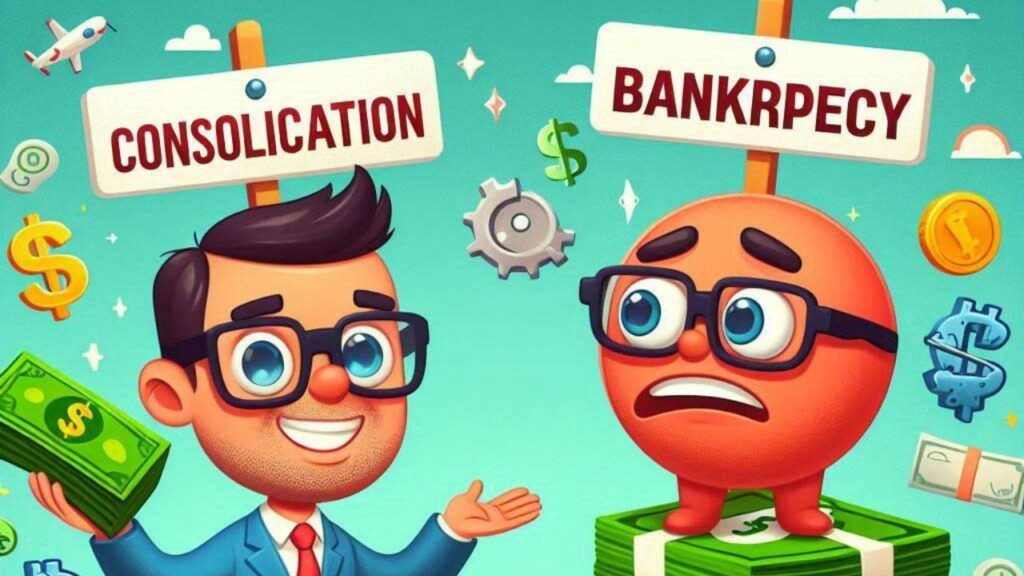Is Debt Consolidation The Same As Bankruptcy? No, debt consolidation involves combining multiple debts into one payment, while bankruptcy is a legal process to discharge or restructure debts.
When it comes to managing debt, two common options often come up: debt consolidation and bankruptcy. Both have their merits, but they serve different purposes.
Understanding the differences can help you make an informed decision on how to tackle your financial challenges. In this post, we’ll walk you through what debt consolidation and bankruptcy are, how they work, and which option might be right for you.
Contents
- 1 What is Debt Consolidation?
- 2 Benefits of Debt Consolidation
- 3 Things to Consider with Debt Consolidation
- 4 What is Bankruptcy?
- 5 How Bankruptcy Works
- 6 Benefits of Bankruptcy
- 7 Things to Consider with Bankruptcy
- 8 Debt Consolidation vs Bankruptcy: Key Differences
- 9 FAQs About Debt Consolidation and Bankruptcy
- 10 Final Thoughts
What is Debt Consolidation?
Debt consolidation is the process of combining multiple debts into one single loan or credit line.
This is typically done to simplify payments, reduce interest rates, or extend the repayment period, making it easier for you to manage your finances. Instead of juggling different bills, you have one payment to make each month.
How Debt Consolidation Works
-
Gather Your Debts: The first step in debt consolidation is identifying all your debts, including credit cards, personal loans, medical bills, and other unsecured debts.
-
Find a Consolidation Loan: Once you know the total amount of your debt, you can apply for a consolidation loan. This loan could be through a bank, credit union, or a specialized debt consolidation company. The idea is to get a loan with a lower interest rate than your current debts, saving you money in the long run.
-
Repay Your Debts: After receiving the consolidation loan, you use it to pay off your existing debts. From that point, you’ll make regular monthly payments to the consolidation loan provider.
Benefits of Debt Consolidation
-
Simplified Payments: Instead of dealing with multiple due dates and amounts, you’ll have just one payment to manage.
-
Lower Interest Rates: By consolidating your debts, you may secure a loan with a lower interest rate, which can reduce the overall amount you pay.
-
Fixed Monthly Payments: Many consolidation loans offer fixed interest rates and payment amounts, which can help you budget more effectively.
Things to Consider with Debt Consolidation
While debt consolidation can be an excellent tool, it’s not a one-size-fits-all solution. Here are some things to consider:
-
Fees: Some consolidation loans come with origination fees or early repayment penalties, so make sure to read the fine print.
-
Discipline Required: Consolidation won’t fix the habits that got you into debt. You’ll need to practice disciplined spending and saving to avoid falling into the same trap.
What is Bankruptcy?
Bankruptcy is a legal process that allows individuals or businesses to eliminate or reorganize their debts under the protection of the court. There are different types of bankruptcy, but the most common for individuals are Chapter 7 and Chapter 13.
-
Chapter 7 Bankruptcy: This type of bankruptcy is known as “liquidation.” It involves the selling of non-exempt assets to pay off creditors. Once the process is complete, most unsecured debts are forgiven, allowing you a fresh financial start.
-
Chapter 13 Bankruptcy: This type of bankruptcy involves restructuring your debts into a repayment plan that lasts 3 to 5 years. You’re allowed to keep your property, but you must follow the court-approved plan for repaying your creditors.
How Bankruptcy Works
-
Filing for Bankruptcy: The process starts when you file a petition with the court. You’ll need to provide detailed information about your debts, income, and assets.
-
Automatic Stay: Once you file for bankruptcy, an automatic stay goes into effect. This means creditors can no longer pursue collection efforts against you, including phone calls and lawsuits.
-
Debt Discharge or Repayment: In Chapter 7, your qualifying debts are discharged after asset liquidation. In Chapter 13, you follow a repayment plan for several years, after which any remaining eligible debts may be discharged.
Benefits of Bankruptcy
-
Fresh Start: Bankruptcy provides the opportunity to eliminate or restructure your debts, giving you a clean slate.
-
Legal Protection: Bankruptcy offers legal protection from creditors, including preventing wage garnishments, lawsuits, and other aggressive collection tactics.
-
Debt Relief: If you qualify, bankruptcy can wipe out most of your unsecured debts, such as credit card balances, medical bills, and personal loans.
Things to Consider with Bankruptcy
-
Impact on Credit Score: Bankruptcy can significantly hurt your credit score, and the record stays on your credit report for up to 10 years (Chapter 7) or 7 years (Chapter 13).
-
Asset Liquidation: In Chapter 7 bankruptcy, some of your property might be sold to pay off your debts. While you can keep certain exempt assets, you may still lose some possessions.
-
Not All Debts Are Dischargeable: Bankruptcy doesn’t discharge all types of debts. For example, student loans, alimony, and child support are usually not discharged.
See Also: Can Teachers Get Credit Card Debt Forgiven?
Debt Consolidation vs Bankruptcy: Key Differences
Now that you have an overview of both options, let’s break down the key differences:
-
Purpose:
-
Debt Consolidation is a method of combining multiple debts into a single loan to make payments easier or lower interest rates.
-
Bankruptcy is a legal process to eliminate or reorganize your debts, which can include liquidating assets or setting up a repayment plan.
-
-
Effect on Credit:
-
Debt Consolidation can improve your credit score over time, especially if you make timely payments on the new loan.
-
Bankruptcy will have a more severe and lasting impact on your credit score, making it harder to secure new credit for several years.
-
-
Eligibility:
-
Debt Consolidation is available to anyone with debt, as long as you qualify for a loan.
-
Bankruptcy is available to anyone facing overwhelming debt, but you must meet certain criteria to file, and it involves a legal process.
-
-
Cost:
-
Debt Consolidation may involve some fees, but generally, it doesn’t cost as much as filing for bankruptcy.
-
Bankruptcy comes with court fees, legal fees, and the potential loss of assets, but it can ultimately provide more significant debt relief.
-
-
Duration:
-
Debt Consolidation usually lasts for the life of the loan (1-5 years), but once the loan is paid off, the process is complete.
-
Bankruptcy can take 3-5 years for Chapter 13 or as little as a few months for Chapter 7, but the effects can linger on your credit report for up to a decade.
-
Summary
| Aspect | Debt Consolidation | Bankruptcy |
|---|---|---|
| Definition | Combining multiple debts into one loan or payment plan. | A legal process to eliminate or reorganize debts. |
| Purpose | Simplify debt payments, lower interest rates, and make repayment easier. | To get rid of or restructure overwhelming debts. |
| Impact on Credit Score | Can improve credit score over time if payments are made on time. | Significantly lowers credit score, and the record stays for up to 10 years (Chapter 7) or 7 years (Chapter 13). |
| Eligibility | Available to anyone with debt who qualifies for a consolidation loan. | Available to individuals facing overwhelming debt, but you must meet specific criteria to file. |
| Cost | Loan fees, interest rates, and potential setup fees. | Court fees, legal fees, and possible asset liquidation costs. |
| Effect on Assets | No effect on assets (unless secured debt is involved). | In Chapter 7, non-exempt assets may be liquidated. In Chapter 13, assets are typically retained. |
| Duration | Loan duration (typically 1-5 years). | Chapter 7 is quick (a few months); Chapter 13 lasts 3-5 years. |
| Types of Debt Covered | Mostly unsecured debts like credit cards, medical bills, personal loans. | Both secured and unsecured debts can be discharged (though not all). |
| Debt Discharge | No debt discharge; you still owe the full amount but with a single payment plan. | Most unsecured debts are discharged in Chapter 7, or restructured in Chapter 13. |
| Long-Term Financial Impact | Can help improve financial health if managed well. | Long-lasting impact on credit and financial reputation, but can provide a fresh start. |
| Alternatives | Debt management plans, negotiating with creditors, or other options. | Limited to those who can’t manage their debt through other means. |
FAQs About Debt Consolidation and Bankruptcy
Will Debt Consolidation Improve My Credit Score?
Yes, if you make regular payments on your consolidation loan, it can help improve your credit score over time. However, if you continue to rack up new debt, it may have little impact.
Can Bankruptcy Be Avoided?
Yes, bankruptcy can often be avoided through debt consolidation, debt management, or negotiating with creditors. However, if your debts are insurmountable, bankruptcy might be the most realistic option.
What Happens to My House if I File for Bankruptcy?
It depends on the type of bankruptcy and your state’s exemptions. In Chapter 7, you may have to sell your house if there’s equity in it, but in Chapter 13, you may be able to keep your house by adhering to a repayment plan.
Is Debt Consolidation Available for All Types of Debt?
Debt consolidation typically applies to unsecured debts, such as credit card bills and personal loans. Secured debts, like mortgages or auto loans, cannot be consolidated in the same way.
Which is Better: Debt Consolidation or Bankruptcy?
It depends on your situation. Debt consolidation is ideal if you can afford to repay your debts but need a simpler, more affordable way to manage them. Bankruptcy might be the better choice if your debts are overwhelming and you need a legal fresh start.
Final Thoughts
Both debt consolidation and bankruptcy are powerful tools for managing financial distress, but they come with different consequences.
Debt consolidation can be a great way to streamline your payments and lower interest rates, while bankruptcy offers a more drastic solution for those overwhelmed by debt.
It’s crucial to carefully evaluate your situation, consider both options, and perhaps consult with a financial advisor to determine the best course of action for you.
Remember, no matter which path you choose, the goal should always be to get back on your feet and regain control over your financial future.

Kaiya Acosta recently finished studying finance. He has always wanted to create a blog about money. Now, he is making his dream real. Kaiya is from Texas, USA, and loves helping people learn how to manage their money better.

